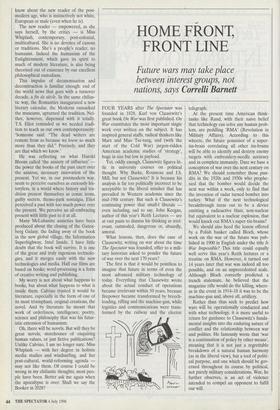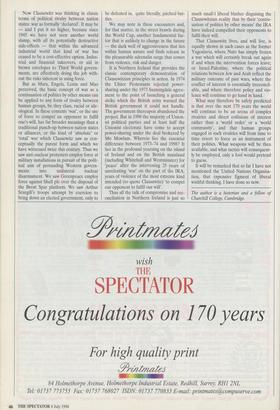HOME FRONT, FRONT LINE
Future wars may take place between interest groups, not
nations, says Correlli Barnett FOUR YEARS after The Spectator was founded in 1828, Karl von Clausewitz's great book On War was first published. On War constitutes the most important single work ever written on the subject. It has inspired general staffs, radical thinkers like Marx and Mao Tse-tung, and (with the start of the Cold War) jargon-ridden American academic studies of 'strategy', huge in size but low in payload.
Yet, oddly enough, Clausewitz figures lit- tle in university courses on political thought. Why Burke, Rousseau and J.S. Mill, but not Clausewitz? It is because his analysis is far too politically incorrect to be acceptable to the liberal mindset that has prevailed in Western academia since the mid-19th century. But such is Clausewitz's continuing power that small-1 liberals even including, sad to say, John Keegan, author of this year's Reith Lectures — are at vast pains to dismiss his thinking as irrel- evant, outmoded, dangerous or, absurdly, amoral.
What lessons, then, does the case of Clausewitz, writing on war about the time The Spectator was founded, offer to a mili- tary historian asked to ponder the future of war over the next 170 years?
The first is that it would be pointless to imagine that future in terms of even the most advanced military technology of today. Everything that Clausewitz wrote. about the actual conduct of operations became irrelevant within 50 years, because firepower became transformed by breech- loading, rifling and the machine-gun, while logistics and communications were trans- formed by the railway and the electric telegraph.
At the present time American think- tanks like Rand, with their naive belief that technology can solve any human prob- lem, are peddling `RMA' (Revolution in Military Affairs). According to this wheeze, the future possessor of a super- tin-brain correlating all other tin-brains will be able to identify and destroy enemy targets with embroidery-needle accuracy and in complete immunity. Dare we base a conception of war over the next century on RMA? We should remember those pun- dits in the 1920s and 1930s who prophe- sied that the bomber would decide the next war within a week, only to find that the invention of radar turned bomber into turkey. What if the next technological breakthrough turns out to be a device emitting a radioactive blast, non-nuclear but equivalent to a nuclear explosion, that would knock out RMA's super-tin-brains?
We should also heed the lesson offered by a Polish banker called Bloch, whose work on the war of the future was pub- lished in 1900 in English under the title Is War Impossible? This title could equally well serve this year's Reith lectures or a treatise on RMA. However, it turned out 14 years later that war was indeed all too possible, and on an unprecedented scale. Although Bloch correctly predicted a trench stalemate, he believed that the magazine rifle would do the killing, where- as in the event in 1914-18 it was to be the machine-gun and, above all, artillery.
Rather than thus seek to predict how wars will be operationally conducted and with what technology, it is more useful to return for guidance to Clausewitz's funda- mental insights into the enduring nature of conflict and the relationship between war and politics. He famously wrote that 'war is a continuation of policy by other means', meaning that it is not just a regrettable breakdown of a natural human harmony (as in the liberal view), but a tool of politi- cal purpose, and one which should be gov- erned throughout its course by political, not purely military considerations. War, he further observes, is an act of violence intended to compel an opponent to fulfil our will. Now Clausewitz was thinking in classic terms of political rivalry between nation states: war as formally 'declared'. It may be — and I put it no higher, because since 1945 we have not seen another world slump, with all its potentially destructive side-effects — that within the advanced industrial world that kind of war has ceased to be a cost-effective option. Indus- trial and financial takeovers, or aid in brown envelopes to Third World govern- ments, are effectively doing the job with- out the risks inherent in using force.
But as Marx, Engels, Lenin and Mao perceived, the basic concept of war as a continuation of politics by other means can be applied to any form of rivalry between human groups, be they class, racial or ide- ological. In these contexts 'war', or the use of force to compel an opponent to fulfil one's will, has far broader meanings than a traditional punch-up between nation states or alliances, or the kind of 'absolute' or `total' war which Clausewitz saw as con- ceptually the purest form and which we have witnessed twice this century. Thus we saw anti-nuclear protesters employ force at military installations in pursuit of the polit- ical aim of persuading Western govern- ments into unilateral nuclear disarmament. We saw Greenpeace employ force against Shell plc over the disposal of the Brent Spar platform. We saw Arthur Scargill's troops attempt by coercion to bring down an elected government, only to be defeated in, quite literally, pitched bat- tles.
We may note in these encounters and, for that matter, in the street brawls during the World Cup, another fundamental fac- tor that is unlikely to change in the future — the dark well of aggressiveness that lies within human nature and finds release in the pleasurable adrenalin surge that comes from violence, risk and danger.
It is Northern Ireland that provides the classic contemporary demonstration of Clausewitzian principles in action. In 1974 the Ulster Protestants rejected power- sharing under the 1973 Sunningdale agree- ment to the point of launching a general strike which the British army warned the British government it could not handle. The government thereupon abandoned the project. But in 1998 the majority of Union- ist political parties and at least half the Unionist electorate have come to accept power-sharing under the deal brokered by Mo Mowlam. Wherein lies the essential difference between 1973-74 and 1998? It lies in the profound yearning on the island of Ireland and on the British mainland (including Whitehall and Westminster) for `peace' after the intervening 25 years of unrelenting 'war' on the part of the IRA, years of violence of the most extreme kind intended (to quote Clausewitz) 'to compel our opponent to fulfil our will'.
Thus all the talk of compromise and rec- onciliation in Northern Ireland is just so much small-1 liberal blather disguising the Clausewitzian reality that by their 'contin- uation of politics by other means' the IRA have indeed compelled their opponents to fulfil their will.
That Clausewitz lives, and will live, is equally shown in such cases as the former Yugoslavia, where Nato has simply frozen a war which will certainly break out again if and when the intervention forces leave; or Israel-Palestine, where the political relations between Jew and Arab reflect the military outcome of past wars, where the conflict of interest is essentially irreconcil- able, and where therefore policy and vio- lence will continue to go hand in hand.
What may therefore be safely predicted is that over the next 170 years the world will continue to be an arena of complex rivalries and direct collisions of interest rather than a 'world order' or a 'world community', and that human groups engaged in such rivalries will from time to time resort to force as an instrument of their politics. What weapons will be then available, and what tactics will consequent- ly be employed, only a fool would pretend to guess.
It will be remarked that so far I have not mentioned the United Nations Organisa- tion, that expensive figment of liberal wishful thinking. I have done so now.
The author is a historian and a fellow of Churchill College, Cambridge.















































































































 Previous page
Previous page